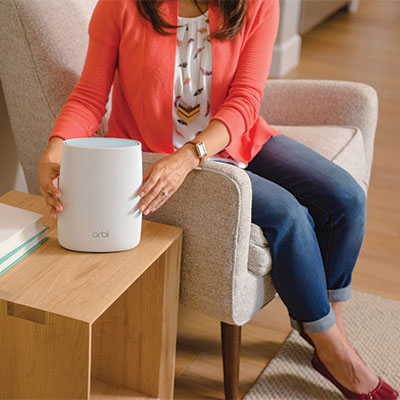Better WIFI Networks

Better Wi-Fi
Mesh networks curb dreaded dead zones

By Erik J. Martin
WHETHER YOU’RE TRYING to stream a Netflix movie to your smart TV, upload new photos to Facebook while making dinner or listen to a podcast as you shovel the walk, buffering delays can quickly sour your wireless experience. You’ve got too many devices divvying up the Wi-Fi signal pie at the same time, all reliant on a router that may be too far away to be effective.
Now, there’s a solution that can clear up Wi-Fi dead spots in your home and amp up the signal. It’s called mesh networking, and it comes in the form of plug-and-play "node" devices.
Node news is good news
If you have a large home and a lot of devices using Wi-Fi, mesh is the mode of choice, say the pros.
"The wireless signal from a single Wi-Fi router fades every time it passes through a wall, especially at long distances, resulting in slower speeds," explains David Henry, a Costco member and senior vice president for Netgear, makers of the Orbi line of mesh products. "Instead, mesh uses multiple wireless access points [nodes] placed around the home to fill it with a strong Wi-Fi signal."
Costco member Glenn Fleishman, a Seattle-based tech reviewer for Macworld and PCWorld, says conventional home Wi-Fi networking relies on a "hub-and-spoke" model, where the router is the hub and other routers or Wi-Fi extenders are spokes. Setup can be complicated. "Mesh networks end this by requiring effectively no configuration," says Fleishman. You simply plug in the nodes and they self-configure and find each other, he notes. Most importantly, mesh networking provides superior coverage and faster internet speeds, "which allows multiple high-definition streams to work on the same home network without hiccups."
Family-friendly Wi-Fi
David Rewalt got so fed up with Wi-Fi hiccups in his 5,500-square-foot home in Great Falls, Virginia, that he installed a three-node mesh kit last summer. Now his family is able to enjoy network speeds up to 400 megabytes per second (read: very, very fast) throughout the house. "With my wife and I working from home and making phone calls and client demonstrations over the internet, we need the performance this kind of system provides," says Rewalt, a Costco member. "Plus, the kids can now stream and download super fast." If you’ve got a home larger than 1,000 feet—especially one with thick floors and walls built with lathe and plaster, brick or stone—or live in a congested area like a city apartment, you’re a good candidate for mesh. It can also help get internet to garages. "And the faster the broadband speed you pay for, the more likely you’ll benefit from mesh," says Henry.
Setup is simple
Jim Salter, an independent system administrator in Columbia, South Carolina, and contributor to Wirecutter, says a mesh kit can either replace your existing router entirely or you can keep your router and just turn off its Wi-Fi functionality. "If you’re not using a router, you connect your mesh system to your DSL or cable modem and reboot," says Salter, who notes that proper node placement is important for the best performance. "Put the main node where the internet comes into your house and a second node close to the center of your home."
Erik J. Martin is a Chicago area writer.
The Costco Connection >
Mesh is fast, but is it secure?
HOME Wi-Fi networks have come under increased attack by clever hackers. Which begs the question: How vulnerable are mesh networks in the home? "They’re as safe as any other consumer network gear," says IT expert Jim Salter. Most systems require you to set up a new mesh Wi-Fi network with login credentials. Experts recommend creating a long, unique password that includes uppercase, lowercase, numeric and special characters, or a three- to four-word pass phrase that isn’t obvious.—EJM
The Costco Connection
Costco features the Netgear Orbi tri-band Wi-Fi system in the warehouses and online at Costco.com. (Item #1113503)


